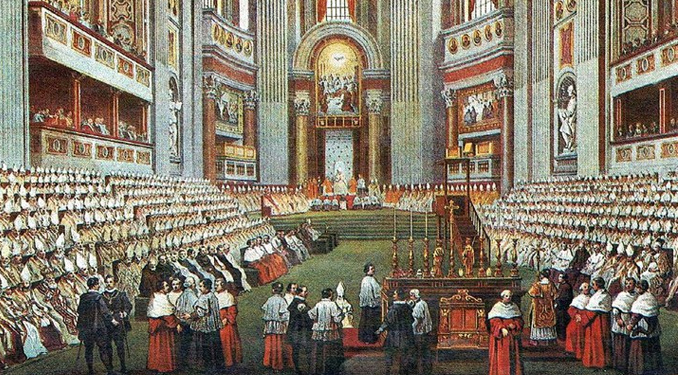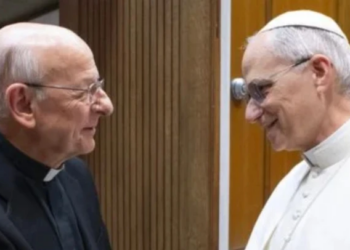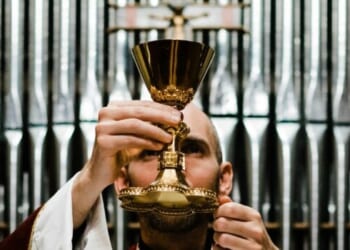
In an age of radical individualism and ideological rebellion against every form of authority, the Catholic tradition offers a necessary and urgent corrective. Rooted in Sacred Scripture, developed by the Fathers of the Church, refined by St. Thomas Aquinas, and clarified by the Magisterium, the Christian understanding of authority is neither authoritarian nor permissive. It is a structured reflection of divine love. Authority is granted to leaders by God, not for domination, but to promote the common good and guide souls to their supernatural end. And the pope, as the Vicar of Christ, serves as the father of the universal Church.
As we unite in prayer for a new pope, let us likewise ask God for a restoration of faith and divine order within the Church, which can only come about by a renewed understanding and charitable exercise of papal authority.
Rebellion and Disorder: Lessons from the Fall
The disobedience of Adam and Eve was the first rebellion against divine authority. Their fall—“you will be like God” (Gen 3:5)—was a rejection of God’s paternal governance. The Catechism teaches, “Man, tempted by the devil… let his trust in his Creator die in his heart” (CCC 397). Through autonomous rebellion, Adam and Eve did not become “more creative, free expressions of themselves” but instead lost their freedom and communion with God, becoming slaves of sin, concupiscence, and despair.
All subsequent rebellion, whether doctrinal, liturgical, or moral, is an echo of that first rupture, because authority is appointed by God to safeguard truth, love, and order. Just as fatherhood in the family is necessary to protect and guide, the papal office is necessary to preserve order, unity, and truth in the Church. Disorder in the Church often begins with disorder in either our understanding of authority (e.g., Martin Luther) or with misuse of authority by the one entrusted with it (e.g., Henry VIII). Note that it is important to frame this discussion within the context of the Protestant Revolt because the rejection of authority within (and outside) the Church can be traced back to that time.
Roots of Ecclesial Authority
The papacy is founded on the primacy of Peter among the Apostles. Christ’s words—”You are Peter, and on this rock I will build my Church… I will give you the keys of the kingdom of heaven” (Mt 16:18-19)—establish the foundational principle of ecclesial order. Authority in the Church is not invented by man, but instituted by Christ.
St. Paul confirms this ecclesial structure when he speaks of the Church built “on the foundation of the apostles and prophets, Christ Jesus himself being the cornerstone” (Eph 2:20). The governance of the Church is not a human bureaucracy but a sacramental reality, divinely ordained.
The Church Fathers consistently acknowledged Peter’s unique role. St. Irenaeus, writing in the second century, emphasized the necessity of unity with the Roman Church because of its preeminent authority: “For it is a matter of necessity that every Church should agree with [Rome], on account of its preeminent authority” (Adversus Haereses, III.3.2). St. Cyprian taught that the See of Peter is the principle and foundation of unity. St. Augustine taught that Peter held a primacy among the apostles and that this primacy endures in his successors.
The Petrine office, then, was understood as a divine institution from the beginning, intended to safeguard unity and orthodoxy.
St. Thomas Aquinas, in turn, articulated the nature of just governance: “Law is a rule and measure of acts… ordered to the common good” (ST I-II, Q.90, a.1,2). Authority must serve truth and goodness. Even papal authority, though divinely instituted, is not arbitrary. It must be rational, just, and directed to the sanctification of souls. Aquinas insists that obedience to human authority is due only when it does not conflict with divine law (ST II-II, Q.104, a.5).
The pope, though possessing the fullness of ecclesial power, is bound by the revelation entrusted to the Apostles and preserved by Tradition.
Papal Authority in Collegial Context
St. Robert Bellarmine (1542–1621), a Doctor of the Church, defended the divine institution of the papal office, insisting that the pope, as successor of Peter, possesses primacy of jurisdiction over the whole Church. Yet he also made clear the limits of papal authority. Bellarmine taught that the pope cannot change divine revelation, overturn ecumenical councils, or command what is contrary to natural or divine law. “If the Pope were to command something contrary to natural or divine law, then it would be lawful to resist him.”
He emphasized that the pope is within the Church, not above it: “The Pope is not above the Church, but within the Church; he is the first among the bishops, but still a bishop” (Controversiae).
Bellarmine’s ecclesiology provided a foundation for Vatican I’s definition of papal infallibility and guards against both Gallicanism (which undermines papal authority) and ultramontanism (which over-expands papal authority). His thought ensures that true papal authority remains a service to unity and orthodoxy, not a license for tyranny or invention. Papal leadership among the college of bishops fosters ordered doctrinal development within the parameters of Tradition, at the same time safeguarding against doctrinal evolution in conformity to popular errors.
Is ecclesial authority flawless? No. Bishops have free will. It took centuries to overcome the Arian heresy, and there was a time when most bishops were Arians. Many modern heresies are “flourishing” in the Church, and it may take several hundred years to root them out again. Time will tell, but it cannot happen without the pope.
We can have bad popes and bishops that are not in conformity with Sacred Tradition, but we can’t restore Sacred Tradition to the Church without the authority of the pope as leader of the college.
The Union of Brest: A Greek Catholic Affirmation of Papal Authority
As a Greek Catholic clergyman, I would be remiss if I did not mention the Union of Brest.
The Union of Brest (1595–96) offers a historical model of ecclesial communion that preserves legitimate liturgical diversity while affirming the universal authority of the Roman Pontiff. The Greek Catholic bishops who acknowledged union with Rome explicitly accredited the pope as “the head of the Catholic Church, the successor of the Apostle Peter, to whom full authority has been given by Christ our God to tend His flock.” At the same time, they insisted on retaining their synodal governance, Eastern liturgical rites, and canonical traditions, thereby safeguarding the unique patrimony of the Christian East.
This arrangement did not dilute papal primacy but harmonized it with a collegial and subsidiarity-based vision of Church governance. The pope was recognized not as an autocrat but as a paternal source of unity whose authority supports—not supplants—the integrity of particular Churches. The bishops requested that their internal ecclesial life not be micromanaged by the Roman Curia, affirming that their clergy be chosen locally and simply confirmed by Rome.
In doing so, the Union of Brest demonstrates that the Petrine office, when properly exercised, strengthens rather than erodes diverse ecclesial traditions and patrimony. It affirms a Catholic vision of unity in truth, wherein communion with the successor of Peter is essential, yet not at odds with the fullness of Eastern Christian identity.
Vatican I and Vatican II
The First Vatican Council’s Pastor Aeternus (1870) solemnly defined the primacy and infallibility of the Roman Pontiff. This primacy is not delegated by bishops or councils but comes from Christ Himself.
It is important to note, however, that Pastor Aeternus defined the doctrine of papal infallibility under very specific conditions: when the pope speaks ex cathedra, intending to define a doctrine of faith or morals to be held by the whole Church (ch. 4, §9). This charism of infallibility is negative in nature. It prevents error under very specific, rare circumstances, but does not guarantee perpetual inspiration, ecclesiastical prudence in every action or comment, or personal papal holiness.
Infallibility does not make the pope a source of new revelation, but a guardian of what has been divinely revealed once for all by Christ to the Apostles.
Of equal importance, Vatican I did not grant the pope absolute power. His authority is bound by Divine Revelation, Sacred Tradition, and the purpose of his office: to guard and transmit the faith of Christ through Apostolic continuity.
The Second Vatican Council deepened this understanding. In Lumen Gentium, the Church teaches that the pope is “the perpetual and visible source and foundation of the unity of both the bishops and of the whole company of the faithful” (LG §23). His office is paternal—unifying and sacrificial—not imperial.
Vatican II also emphasized the importance of episcopal collegiality. The bishops, united with the pope, form a single apostolic body. Lumen Gentium makes clear the pope’s authority is not isolated from the broader life of the Church but exists to preserve her unity in truth.
This unity extends from the teachings of Christ and the Apostles as recorded in Sacred Scripture and handed down through Sacred Tradition—from the Apostles to the Fathers of the Church (AD 100-1100) to the Theologians (AD 1100-1750)—thus maintained by the consistent teaching of the Magisterium since the beginning.
With this in mind, there is no such thing as “Pope Francis’ magisterium” or “Pope Benedict’s magisterium” if we understand that phrase to mean that the current reigning pope has his own personal “magisterium” which somehow supersedes or nullifies the continuous teaching authority of the Magisterium throughout the preceding ages.
Duties of the Roman Pontiff: To Teach, Govern, Sanctify, and Unify
The pope’s authority is inseparably bound to his duties. He is not a monarch in the secular sense but a servant of the servants of God (servus servorum Dei). If he neglects his duty, he is a bad, sinful man, like any other bad man who neglects his duties. Again, the Holy Spirit does not guarantee that every pope will be a saint. There are likely several popes and many bishops in hell. The Church has never shied away from that reality. Judas is in hell (Jn 17:12), and so are many others like him.
We shouldn’t let that bother us or lose our faith over it. Baptism in Christ does not ensure immediate perfection without error for the faithful and clergy alike. We are a Church of sinners, working out our salvation in fear and trembling (Phil 2:12), judged by God according to our merits in the performance of our duties.
The pope’s essential responsibilities include those of any bishop: to teach, govern, and sanctify, but in addition to these three, the pope also has the duty to maintain the unity of the faith as head of the college of bishops:
• Teaching with Clarity: The pope is the custodian of the deposit of faith (1 Tim 6:20), not its inventor. His office exists to “strengthen the brethren” (Lk 22:32) in faith, not to create new doctrines. As the Church’s supreme teacher, he must proclaim the Gospel in continuity with Sacred Tradition. His teaching authority is limited to guiding the faithful toward salvation in harmony with the consistent Magisterial teachings of the Church regarding faith and morals.
• Governing for the Good of the Church: The pope’s governance includes the power to legislate (canon law), to approve bishops, to define doctrine when needed, and to oversee the administration of the sacraments and discipline of the faithful. His governance includes legislative, judicial, and disciplinary power rooted in the mandate to preserve the deposit of faith and sanctify the Church through right worship. The pope governs not as a worldly ruler but as a spiritual father, healer, and guardian of the Church’s communion with Christ.
• Sanctifying the Church: Through his governance of liturgy, sacraments, and discipline, he is responsible for ensuring that the faithful have access to the Sacraments. He is also responsible for ensuring that the sacramental order is free from error and exercised with integrity in harmony with Sacred Tradition.
• Principle of Unity: Without communion with the Roman Pontiff, the visible structure of the Church fragments into competing claims of authority, doctrine, and sacramental validity. The Fathers of the Church, such as St. Irenaeus and St. Cyprian, consistently affirmed that unity with the See of Rome was essential for remaining within the One, Holy, Catholic, and Apostolic Church. The pope binds the bishops together in apostolic communion. Without the papal office, ecclesial unity is left to mere consensus, which is always vulnerable to division. Thus, the pope is not an optional feature of Church governance but an essential sign and servant of Catholic unity.
A Path Forward: Rediscovering the Papal Office
In our time of moral confusion, clerical scandal, and ecclesial fragmentation, a renewed understanding of papal authority is urgently needed. This is not a call for authoritarianism or papal maximalism, but for fidelity to the Church’s teaching on the office and limits of the pope’s duties and responsibilities.
The pope is the father of the Church. But like every father, his authority is deviant if it does not serve life, truth, and divine order. Restoration will not come through papal novelty but through papal fidelity to Christ, Scripture, and Tradition.
The faithful must fervently pray for a new Holy Father who will embrace his duties well and support him when he teaches the truth. We also need to pray for our bishops, that they may have the courage to make an appeal and remind the pope, at times, of his God given duties, if and when he departs from them. For as St. Paul once rebuked Peter to his face (Gal 2:11), so too must we remember that even the pope must be respectfully corrected when he fails in his duty. The pope is human and a sinner, like our own biological fathers, and like our own fathers, we must honor and obey him so long as he does not contradict God’s law.
Authority is a blessing, not a burden, when it is rooted in the truth and ordered toward salvation. May the Church rediscover the sacred purpose of papal authority and, through it, restore faith and divine order within the Church.
If you value the news and views Catholic World Report provides, please consider donating to support our efforts. Your contribution will help us continue to make CWR available to all readers worldwide for free, without a subscription. Thank you for your generosity!
Click here for more information on donating to CWR. Click here to sign up for our newsletter.







